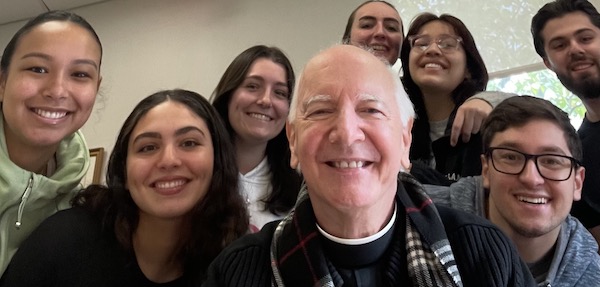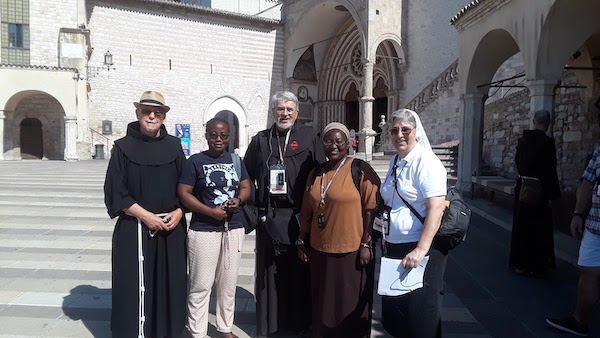
PARK SLOPE — They’re unsung heroes of the Diocese of Brooklyn, quietly working away from the spotlight. And that’s just the way they like it.
Religious brothers are primarily known for founding schools like Xaverian High School and teaching generations of students. But they perform other services, including social work, health care, and feeding the hungry in soup kitchens.
If there’s a lack of attention, that’s just fine with Brother Thomas Barton, OSF, a Franciscan who professed his vows 57 years ago and has served in numerous capacities over the decades, including directing Community Help in Park Slope (CHiPS), a food pantry and soup kitchen.
“We like flying under the radar,” he said.
“I often think of brothers as the forgotten children because sisters and priests get so much attention,” said Sister Maryann Seton Lopiccolo, episcopal delegate for religious in the diocese.
“But brothers are a steady presence. Whenever the need arises, they respond to it,” she added.
There are currently 73 men religious in the diocese, half the number there were a decade ago. There is a reason for the declining ranks — brothers are aging, and few younger men are replacing them.
Yet, the ones who remain do their work cheerfully, grateful for the chance to serve God.
“It’s been a very good life for me,” said Brother Mike Sheerin, FMS, who has been a member of the Marist Brothers for 29 years and serves as campus minister at St. John’s University.
Brother Mike taught at Christ the King High School for a few years and then at Archbishop Molloy High School for 17 years before serving as the Marist Brothers’ vocations director for 14 years. That brought him to college campuses, where he enjoyed talking to students about the Marists’ mission.
He then fulfilled a desire for parish-level work by serving as youth minister at St. Barbara Church in Bushwick.
Looking at his nearly three decades of service, one memory stands out. It was a brief conversation with a St. John’s University student when he was leaving the school in 2007 to perform vocational work. He eventually returned to St. John’s.
On that day in 2007, he was walking on campus when he heard a young woman yelling his name. He didn’t recognize her.
“She told me, ‘I just want you to know I never needed you. I never went to the programs you ran. But I liked knowing that you were here if I needed you.’ I was filled with tears when she said that,” Brother Mike recalled. “What a moment of God’s grace that was for me.”

Brother Thomas’ ministry has been divided between education and social work. “My own interest was always with the handicapped. In my family, we had a number of disabled veterans from World War II and Korea with PTSD, so I studied special education at Columbia University,” he explained.
He taught at Christ the King Regional High School in Middle Village and later served as an administrator in the diocese’s special education program.
In the early 1970s, he was living in the friary at St. Francis Xavier Church in Park Slope and became involved in a new project. “It was really an extraordinarily challenging neighborhood, and the parish was excellent,” he recalled. “And that’s where the CHiPS soup kitchen came from.”
He has also helped people in need in other ways. He was a social worker at two hospitals in New Jersey for 15 years — assisting HIV/AIDS patients — while at the same time providing HIV/AIDS education programs at the Hudson County Correctional Facility.
“I saw much more than I wanted. This was a time before there were medicines to help AIDS patients,” he recalled.
Brother Thomas talked to The Tablet as he was preparing to leave for Italy to lead a pilgrimage to Rome and Sicily. “It’s another one of the jobs that I enjoy,” he said. “On the pilgrimages, I get to travel with sisters and friars from around the world.”
Brother David Carroll, FSC, took his vows with the De La Salle Brothers more than 60 years ago and has enjoyed every minute of it. “A lot of my life has, ironically, been centered in Brooklyn, even though I have traveled the world. My official passport reads 56 countries,” he said.
Fresh out of Bishop Loughlin High School, he decided to become a De La Salle brother. “And that took me on my journey to Catholic University in Washington, D.C., where I got my bachelor’s degree in physics,” he recalled.
He received a government grant, which he used to study for his master’s degree at Brown University.
Much of Brother David’s life has been involved in teaching science, technology, and religion. He taught religion, calculus, and computer science at Mater Christi Diocesan High School in Astoria from 1964 to 1972
His expertise in computer science led to another opportunity — a data processing consultant for the diocese.
“The diocese wanted to link computers and the telephone system because they knew at that time that the telephone system, instead of being a rotary dial, was going to be replaced by buttons. This was the period of 1965-1968. I was a consultant for the diocese on an interactive TV project,” he recalled.
Brother David eventually went to work for the Archdiocese of New York to direct its data systems center. In the early 1980s, Cardinal Terence Cooke appointed him research director of the Pope John Paul II Center of Study and Peace.
“And that took me to all parts of the world and completely changed my life because instead of being a local boy, I was now in every country in the world you could think of,” he said.
He also spent several years working for the Catholic Near East Welfare Association, eventually becoming the assistant to the general secretary.
Brother David is now retired but said his love of learning and education is still strong. And in everything he did, he kept in mind his central goal as a De La Salle brother — to help people.

It was wonderful reading how he used all his talents for the love of God. It inspired me.
I know Brother Mike from Christ the King, my younger brother knows him from Archbishop Malloy and my daughter knows him from St. John’s. He is such a wonderful and kind person!